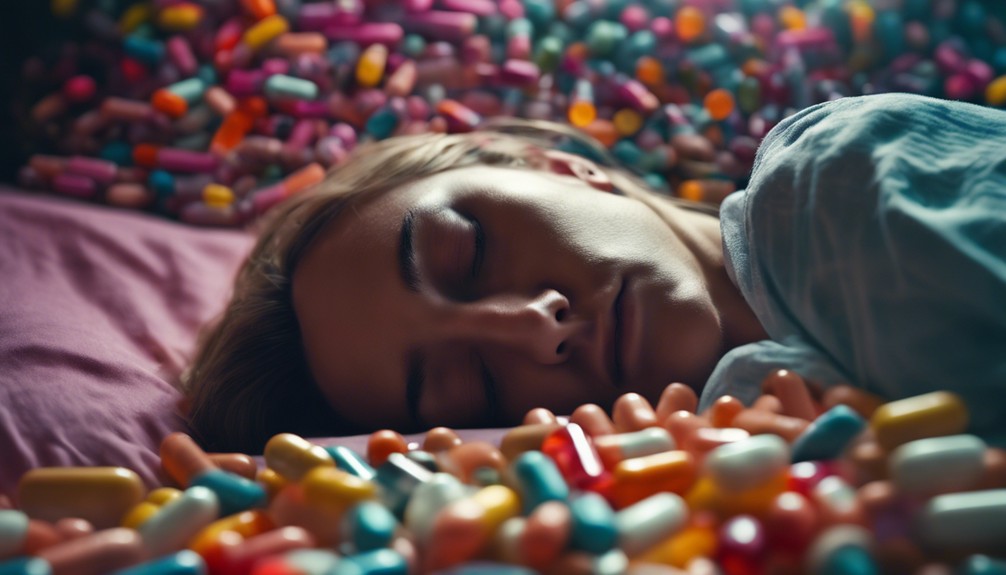When I dream about drugs, it's like unraveling a hidden message from my subconscious. The symbolism behind drug use in dreams can be complex and multifaceted, hinting at deeper emotional connections and unexplored desires.
But what exactly do these dreams signify?
Let's explore the common types of drugs that appear in dreams, the underlying emotions they may represent, and how to navigate the insights they offer.
Common Types of Drugs in Dreams
When exploring common types of drugs in dreams, one may encounter a range of substances that reflect various aspects of the dreamer's psyche. Dream analysis often involves delving into the symbolic meanings behind these substances, providing insight into the individual's inner thoughts and emotions.
In the realm of dream analysis, the appearance of drugs can be a powerful tool for psychological interpretation. Different drugs represent different facets of the dreamer's subconscious mind. For instance, the presence of stimulants like caffeine or amphetamines may signify a desire for increased energy or motivation in waking life. On the other hand, substances like alcohol or sedatives could indicate a need for relaxation or escapism.
Understanding the psychological implications of these substances can offer valuable insights into the dreamer's current mental state and emotional needs. By examining the common types of drugs that appear in dreams, one can gain a deeper understanding of their inner workings and uncover hidden desires or anxieties that may be influencing their waking life.
Symbolism of Drug Use in Dreams
The interpretation of drug use in dreams unveils symbolic representations of the dreamer's subconscious desires and conflicts. It delves into hidden meanings and provides a platform for psychological exploration.
- Symbolism: Drug use in dreams often symbolizes a need for escape or a desire to avoid facing certain emotions or situations in waking life. It can represent a yearning for altered states of consciousness or a way to cope with stress and anxiety.
- Internal Conflicts: Dreaming about drugs can highlight internal struggles and conflicts within the dreamer. It may indicate unresolved issues, guilt, or a sense of powerlessness. These dreams can serve as a mirror to the dreamer's inner turmoil and the need for resolution.
- Desires and Fears: The presence of drugs in dreams can also reflect the dreamer's deep-seated desires or fears. It may point towards unfulfilled wishes, forbidden desires, or the fear of losing control. Understanding the symbolic significance of drug use in dreams can offer valuable insights into the dreamer's psyche.
Emotional Associations With Drug Dreams
Exploring the emotional connections associated with drug dreams provides a deeper understanding of the dreamer's subconscious motivations and psychological landscape. When delving into dream interpretation, feelings play a crucial role in deciphering the underlying message of drug-related dreams. These dreams often evoke a wide range of emotions such as fear, guilt, curiosity, or even euphoria. Each emotion serves as a clue for psychological analysis, unveiling the dreamer's innermost thoughts and concerns.
Psychological analysis of drug dreams involves examining the feelings experienced during the dream and linking them to waking life experiences. For instance, feelings of guilt in a drug dream may indicate unresolved issues or regrets in the dreamer's conscious life. On the other hand, feelings of euphoria could signify a desire for escapism or a need for excitement and stimulation. By exploring these emotional associations within drug dreams, individuals can gain valuable insights into their subconscious desires, fears, and motivations. Such interpretations offer a window into the complexities of the human psyche, providing a unique perspective on the dreamer's inner world.
Uncovering Subconscious Desires in Dreams
To delve into dreams and uncover subconscious desires, analyzing emotional connections is paramount. Dreams often serve as a window into our hidden desires, revealing aspects of ourselves that may not be readily apparent in our waking lives. Through dream interpretation, we can gain valuable insights into our psyche and better understand the motivations driving our thoughts and behaviors.
- Unearthing hidden desires: Dreams have a way of bringing to light the desires and longings that we may suppress or ignore during our conscious hours. By examining the symbols and themes present in our dreams, we can begin to unravel the layers of our subconscious and uncover what truly drives us.
- Exploring deeper meanings: Dream interpretation allows us to delve beneath the surface of our consciousness and explore the deeper meanings behind our thoughts and actions. By analyzing the content of our dreams, we can decipher the messages our subconscious is trying to convey.
- Gaining self-awareness: By delving into our dreams and uncovering our hidden desires, we can enhance our self-awareness and gain a clearer understanding of our innermost thoughts and emotions. This self-discovery process can lead to personal growth and a greater sense of fulfillment in our waking lives.
Coping Strategies for Drug-Related Dreams
Uncovering hidden desires in dreams can lead individuals to develop effective coping strategies for drug-related dreams. When faced with unsettling dreams involving drugs, incorporating relaxation techniques can be beneficial. Engaging in deep breathing exercises, progressive muscle relaxation, or even aromatherapy before bedtime can help calm the mind and reduce the likelihood of triggering drug-related dreams.
Additionally, practicing mindful meditation can aid in acknowledging these dreams without letting them induce anxiety or distress. By observing these dreams non-judgmentally and letting them pass without attaching undue significance, individuals can learn to detach from the emotional impact of such dreams.
Creating a soothing bedtime routine, such as reading a book or listening to calming music, can also help set the stage for more peaceful sleep, potentially reducing the occurrence of drug-related dreams. By combining these relaxation techniques and mindfulness practices, individuals can develop a healthier relationship with their dreams and cultivate a sense of control over their subconscious experiences.
Conclusion
Dreams about drugs can be a reflection of our subconscious desires, emotional struggles, or even symbolize a need for escape or self-medication.
By exploring the common types of drugs in dreams, their symbolism, and our emotional associations with drug use in dreams, we can gain insight into our inner thoughts and feelings.
So, next time you dream about drugs, ask yourself: what's your mind trying to tell you?



